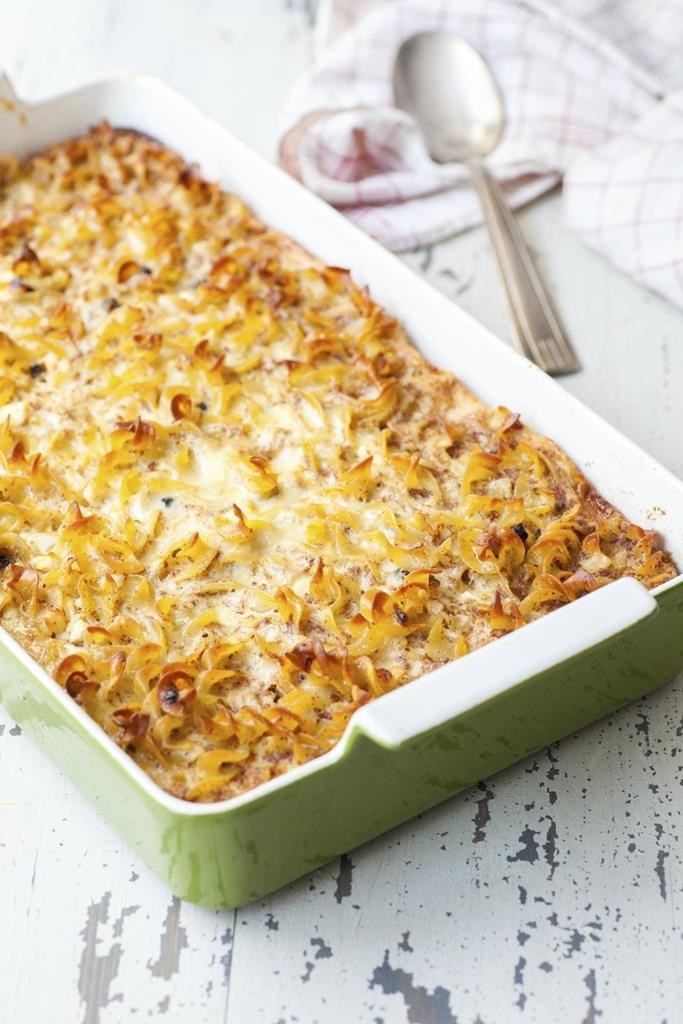The Jewish holiday of Yom Kippur, which begins this year on Sunday evening (Sept. 25), is a solemn 25 hours of fasting and atonement.
But when it's over, fast turns to feast.
The spread at a “break fast” gathering (not to be confused with breakfast) traditionally consists of foods that are made ahead, served either at room temperature or reheated right before serving. Observant Jews don't cook on Yom Kippur, and even if you're less observant, it’s pretty hard to stand in the kitchen cooking while you’re fasting.
BAGELS, LOX, THE FIXINGS
Perhaps the most common foods used to break the fast are bagels and lox (or smoked salmon) with all the fixings. Those typically involve dairy and fish dishes, such as smoked fish, whitefish salad, flavored cream cheeses (“schmears” or “shmears”), pickled herring, capers and cucumber salad.
The break fast meal is usually meat-free, since meat and dairy don't mix in kosher foods.
I always include a noodle kugel in my break fast menu, another traditional offering that can be made ahead and reheated (or served cool, as you like). That, plus egg salad, are substantial vegetarian options for the non-fish eaters.
Jake Cohen, author of the just published “I Could Nosh: Jew-ish recipes Revamped for Everyday” (Harper Collins), mostly adheres to traditional foods for his break fast, but has some firm opinions about the components. Quality counts, he says, and he has dedicated time looking for the best bagels, the best smoked fish, and so on.
“It’s like the difference between a charcuterie board from a high-end cheese shop versus one from a grocery store,” he says.
Cohen is particular about his bagels. Since bagels are usually bought the day before the break fast, they are never at their freshest. Cohen compensates by keeping them whole, placing them on a wire rack on a baking sheet, and heating them for 5 to 7 minutes in a preheated 400 degree oven. This warms them through and crisps the outer crust, bringing them as close as possible to just baked.
Slice them after they come out of the oven, he says, and “you get a short window of the memory of a fresh bagel.”
ORDERING IN
Joe Ariel is the founder and CEO of Goldbelly, an online company that ships foods from restaurants, delis, bakeries and so on across the country.
“This is a busy time for many of our most iconic New York bagel shops and bakeries like Ess-a-Bagels, Russ & Daughters, Breads Bakery babkas, Kossar’s Bialys, Junior’s Cheesecakes, Yonah Schimmel’s knishes, and more,” Ariel says. This year, Goldbelly also starts shipping from another famous New York deli, the 2nd Ave Deli.
Since many people are ordering for a crowd, Ariel says he ships a lot of meal kits for eight to 12 people.
Beyond bagels and salmon, he says, some customers “take their break-the-fast meals to a new level with full meal kits from some of the most famous Jewish chefs. For example, one of my favorite chefs, Mike Solomonov, from Zahav in Philadelphia, does a showstopping braised pomegranate lamb shoulder feast with all of the classic Israeli salatim (salads) and sides to go with it.”
EXPECT BIG APPETITES
How much food should you have for a very hungry crowd? Cohen recommends allowing for two bagels per person.
For smoked fish, I suggest buying ¼ pound per person; for cream cheese 2 ounces per person; and have a generous amount of other sides like tuna, whitefish salad, and egg salad, about 4 ounces per person.
Many people take a bit of this, and a bit of that, so better safe than sorry.
Don’t forget to put out a beautiful platter of sliced tomatoes, onions, and maybe cucumbers, with some capers for sprinkling and lemon wedges for squeezing.
DESSERT
Cohen feels strongly about including dessert in the break fast meal, preferably a cake that can be made ahead and will stay moist for a few days. In his book, the dessert chapter is called “Who doesn’t serve cake after a meal?”, a memorable line from "Seinfeld.”
Honey cake is the traditional cake served at Rosh Hashana and Yom Kippur, with the honey symbolizing sweetness for the year to come.
Ariel says desserts like babka and cheesecake are popular too.
“I feel like we’re in the middle of a babka renaissance this year, as it’s having a moment," he says. "We’ve been seeing some really fun twists on it to make it a little more creative and fun. Breads Bakery is one of my favorites, they are doing this gorgeous apple and honey babka.”
This year, his family is opting for a Brooklyn Blackout cake to wrap up their meal.
___
Katie Workman writes regularly about food for The Associated Press. She has written two cookbooks focused on family-friendly cooking, “Dinner Solved!” and “The Mom 100 Cookbook.” She blogs at https://themom100.com/. She can be reached at [email protected].
___
For more AP food stories, go to https://apnews.com/hub/recipes
Katie Workman, The Associated Press



